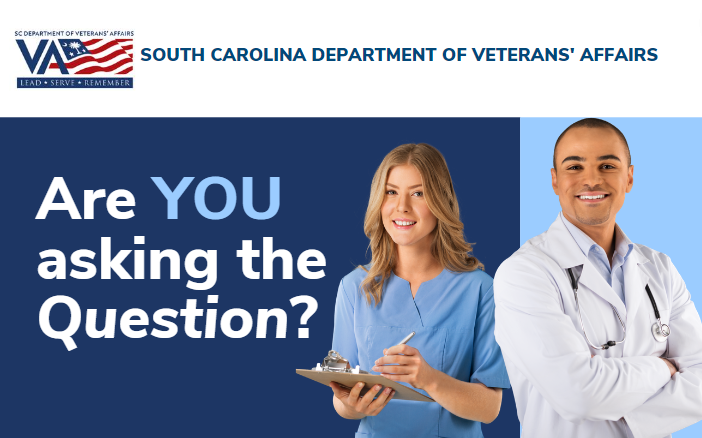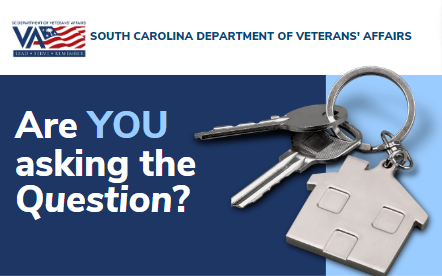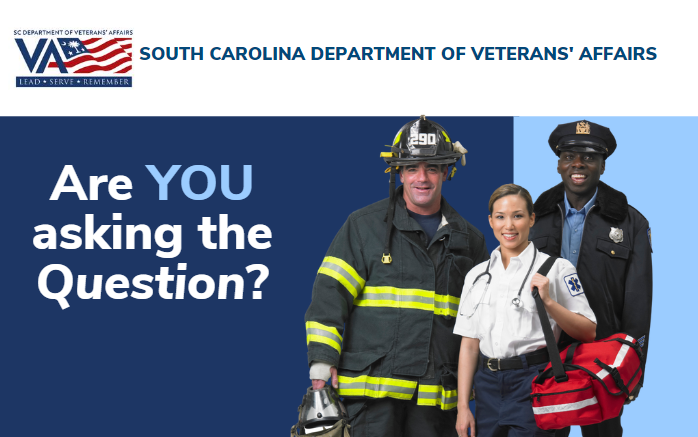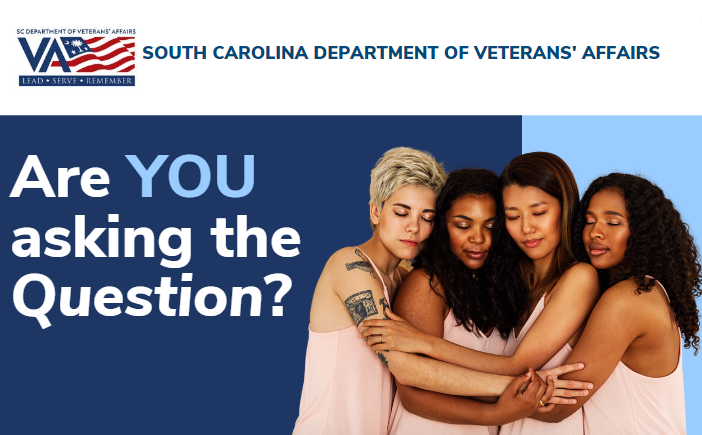'Ask the Question' Campaign
Suicide Prevention: Veterans Affairs Suicide Hotline: Call 988 or 1.800.273.TALK (8255) and press "1" to reach the VA hotline. For more information click here.
The 'Ask the Question' campaign was designed to ask providers in the South Carolina Veteran Coalition and other service providers if their clients or their family members ever served in the military, with the goal of connecting them to organizations that address Veteran suicide or other resources, thus enabling Veterans and their families to THRIVE as valued contributing members of communities in South Carolina.
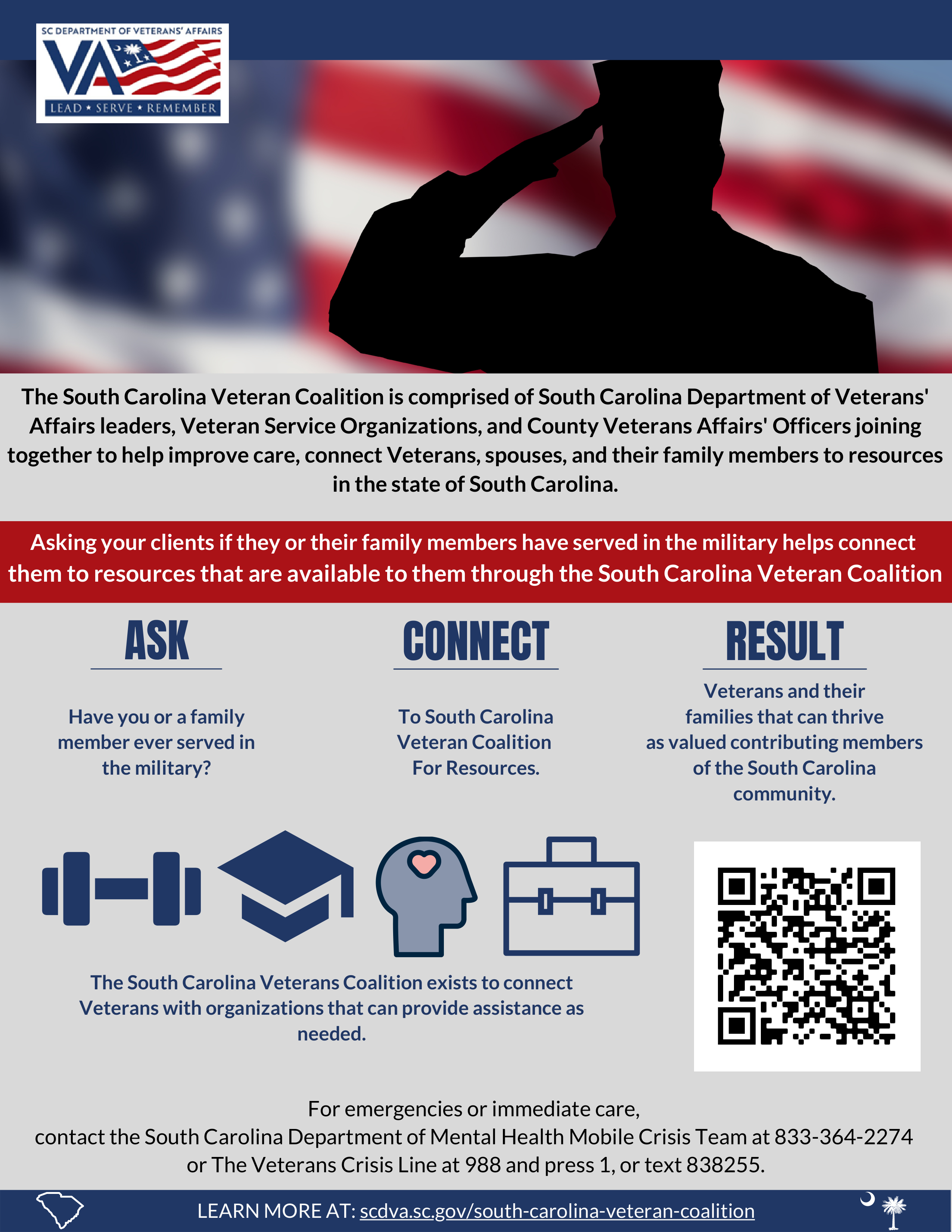
Importance of Asking the Question
Healthcare and Medical professionals encounter Veterans, service members, and military families, but they don't always know it. Veterans do not always identify themselves. They can be proud and stoic, and don’t always ask for help themselves. They may minimize the effect of military service on their health, which can lead to missed diagnoses and incomplete treatment. Veterans need to be aware that they can go to the Veteran’s Affairs Medical Care for treatment or seek treatment by civilian doctors. It is of great benefit to a Veteran and his/her doctor or practitioner if they understand the relationship between military experiences and medical symptoms, as well as having the ability to collaborate effectively with military-Veteran healthcare providers. The way to know that is to ASK!
When the Answer is YES
By asking if he/she has served in the military, the doctor or practitioner will then be able to find out more about the Veteran’s service experience that will facilitate appropriate diagnosis, treatment planning, and referrals. Asking further questions will also help to:
- Build rapport and demonstrate interest by listening to the Veteran
- Identify any physical, medical and/or mental health issues related to service experience that will need further diagnostic work or treatment, or will impact treatment goals
- Identify family supports and links to any needed military and Veteran resources and referrals, including both VA and non-VA programs
Find Resources Near You
Importance of Asking the Question
Housing service providers encounter Veterans, service members, and military families, but they don't always know it. Veterans do not always identify nor ask for help themselves…..even when they are in some kind of trouble or crisis. The way to ensure military-Veteran applicants for housing services get the help they need and deserve is to ASK!
When the Answer is YES
By asking, you may be able to help them identify and access Veteran-specific housing programs and services. Asking further questions will also help to:
- Build rapport and demonstrate interest by listening to the Veteran
- Link a Veteran to any needed military and veteran resources and referrals, including both VA and non-VA programs
- Identify mental health and/or physical or medical issues impeding housing stability
Find Resources Near You
Importance of Asking the Question
Police officers, fire fighters, EMTs, and other first responders encounter Veterans, service members, and military families, but they don't always know it. Veterans do not always identify nor ask for help themselves…..even when they are in some kind of trouble or crisis. Military life can impact an individual's safety in many ways and also the safety of others.
When the Answer is YES
By asking, you may be able to increase your understanding of the situation and help with linking a Veteran to veteran-specific programs, services, and resources/referrals, including both VA and non-VA programs. Asking further questions will also help to:
- Build rapport and demonstrate interest by listening to the Veteran
- Identify potential risk factors and emotional and psychological issues that may impact how best to approach an individual in distress
- Address perceived barriers to seeking support and services
Find Resources Near You
- UPSTATE
- MIDLANDS
- PEE DEE
- LOWCOUNTRY
Importance of Asking the Question
Mental health and substance use disorder service providers encounter Veterans, service members, and military families, but they don't always know it. Veterans do not always identify themselves. They can be proud and stoic, and don’t always ask for help themselves…..even when they need it. Military experience can impact an individual's mental health, habits, and relationships. Appropriate diagnosis and treatment depends on understanding a client's history. The best way to ensure service members and veterans get the best possible care is to ASK!
When the Answer is YES
By asking, you can have a better understand of their challenges and facilitate accurate diagnosis, treatment planning, and referrals. Asking further questions will also help to:
- Build rapport and demonstrate interest by listening to the Veteran
- Link a Veteran to any needed military and veteran resources and referrals, including both VA and non-VA programs
- Identify any past and present service-related stressors and mental health concerns
Find Resources Near You
Importance of Asking the Question
Service providers who specialize in women's services, crisis support, and domestic violence encounter Veterans, service members, and military families, but they don't always know it. Veterans and their spouses can be reluctant to identify themselves. They also can be proud and stoic, and don’t always ask for help themselves. Combat traumas, Military Sexual Trauma (MST), and reintegrating after a military deployment can impact family relationships, anger management, and safety. Appropriate service provision and coordination depends on understanding a client's history and the various challenges, opportunities, and services available to them. The way to ensure service members, Veterans, and their families get the best possible services is to ASK!
When the Answer is YES
By asking, you can increase your understanding of their challenges and better assist them in safely accessing the resources and services they need. Asking further questions will also help to:
- Build rapport and demonstrate interest by listening to the Veteran
- Identify any past and present service-related stressors
- Refer to military and Veteran resources and referrals, including both VA and non-VA programs
Find Resources Near You
Importance of Asking the Question
Colleges, universities and other adult learning institutions encounter Veterans, service members, and military family members, but they don't always know it. Veterans do not always identify themselves. They can be proud and may struggle to acclimate to a civilian learning environment, socially and academically. The best way to ensure military-Veteran students have all the support they need and respect they deserve is to ASK!
When the Answer is YES
By asking if he/she has served in the military, you may then help them make the most out of their learning experience. Asking further questions will also help to:
- Link to military and Veteran resources and referrals, including both VA and non-VA programs
- Address specific barriers to reintegration into the academic world and the transition from military life to college life
- Explore any needs for academic, cognitive, social, emotional, physical accommodations
- Identify ways in which your program and services can assist the Veteran
